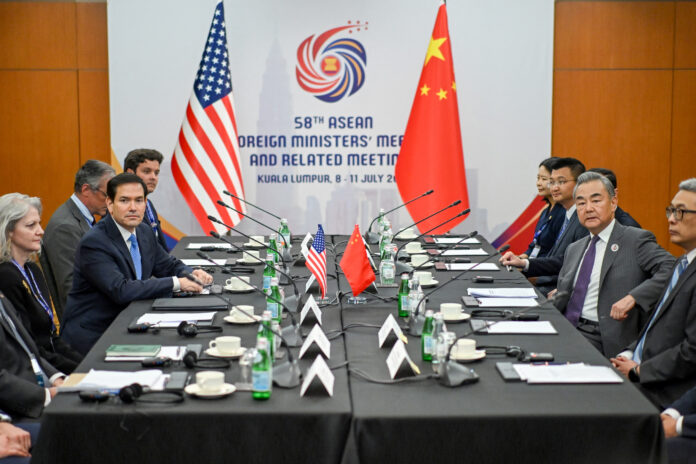The United States should not use tariffs to bully other countries, China said on Friday, as U.S. Secretary of State Marco Rubio played down the possibility that tariffs could enable China to forge closer ties with angry U.S. allies.
Rubio, in Malaysia for a Southeast Asian regional meeting, said he had positive talks with his Chinese counterpart, Wang Yi, adding that there was a “high probability” of a summit between President Donald Trump and Chinese leader Xi Jinping. Rubio said no date had been set.
Why It Matters
China has been a fierce critic of sweeping U.S. tariffs that Trump announced on April 2. He later delayed the implementation of most but China, which has said it will respond with its own tariffs on U.S. imports, now faces a deadline next month to negotiate a deal.
U.S. allies including Japan, South Korea and Thailand as well as partners such as Malaysia and Indonesia face tariffs ranging from 25 percent to 40 percent.
What To Know
Chinese Foreign Minister Wang, also in the Malaysian capital Kuala Lumpur for an Association of Southeast Asian Nations (ASEAN) meeting, has denounced what he called U.S. bullying on trade in his talks with Asian counterparts and presented his country as a steadfast ally.
“China has always been the most reliable stabilising force in a turbulent world and the most reliable partner for ASEAN countries in addressing challenges,” Wang told Southeast Asian foreign ministers, according to media.
In Beijing, a foreign ministry spokesperson said China would not give in to the U.S. “bullying.”
“Our countermeasures against the U.S. bullying are not only to protect our legitimate rights and interests but also to uphold international rules and order, safeguard the common interest of all countries and maintain international fairness and justice,” spokesperson Lin Jian told a briefing.
Photo by MANDEL NGAN/POOL/AFP via Getty Images
Rubio played down anger over the U.S. tariffs saying they were a necessary response to decades of unfair trade. He dismissed the possibility that the tariffs could give China the opportunity to build its ties with traditional U.S. allies in Southeast Asia.
“We don’t view this as an opening for anyone,” Rubio told reporters when asked if China could take advantage to make diplomatic inroads.
“We view it as an opportunity to reset global trade in a way that’s fair for Americans after two or three decades of unfairness,” Rubio said.
He said his meeting with Wang had been “very positive” and there was a “high probability” of a meeting between Xi and Trump soon, adding: “They both want it to happen.”
What People Are Saying
Rubio, referring to Trump, told reporters in Kuala Lumpur: “Trade needed to be revisited, he campaigned on that and that’s what he’s doing, he’s setting it out on a global scale.”
Chinese foreign ministry spokesperson Lin Jian told a briefing in Beijing: “In the face of U.S. bullying and hegemony, compromise and concessions are not a way out.”
What Happens Next
Countries will try to negotiate deals with the United States before the August deadline.

